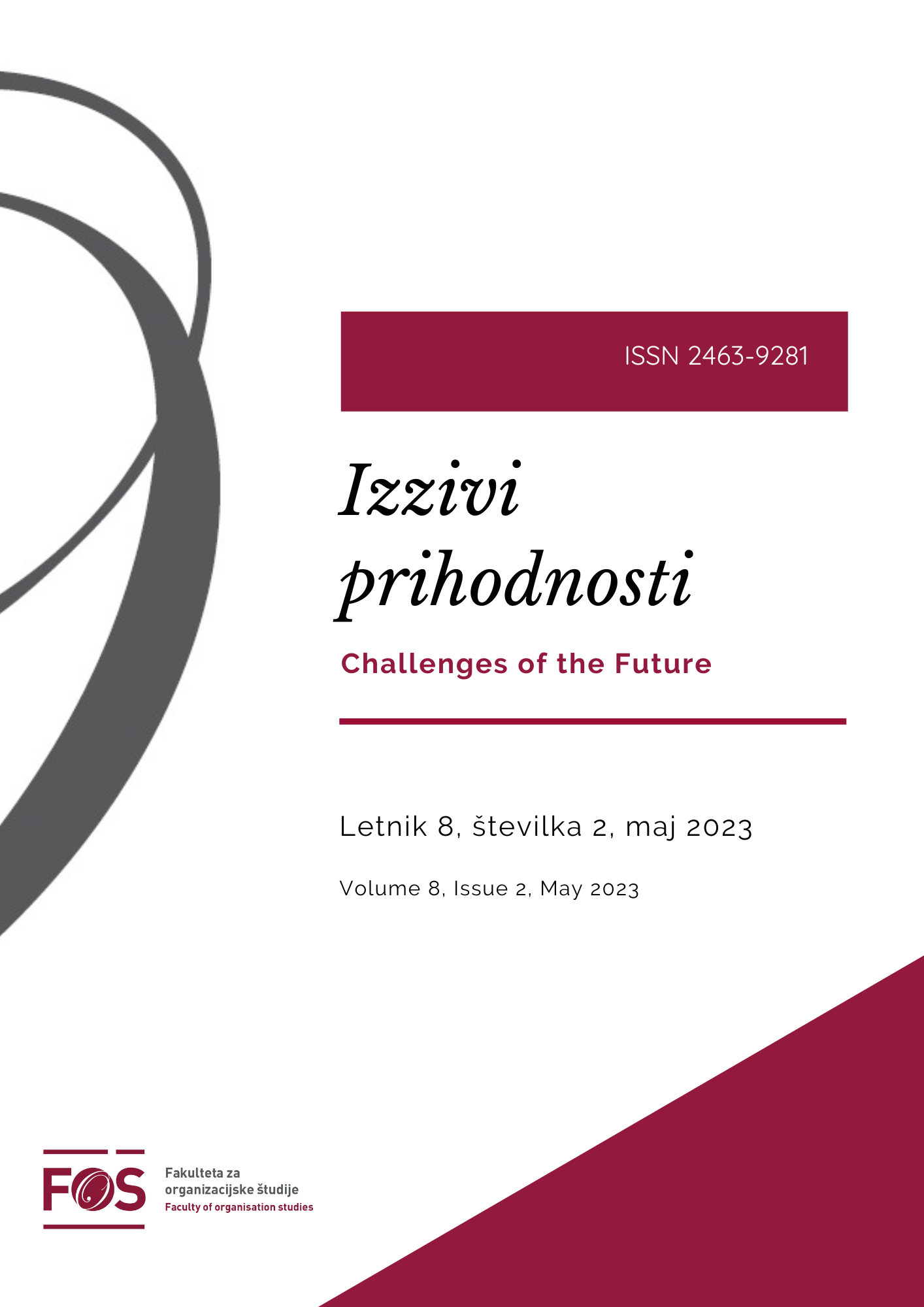Dimenzije kakovosti zdravstvene obravnave otrok/mladostnikov s posebnimi potrebami
DOI:
https://doi.org/10.37886/ip.2023.005Ključne besede:
Ključne besede: posebne potrebe, oviranost, otroci in mladostniki, zdravstvena obravnava, kakovost, zadovoljstvo, starši, na pacienta osredotočena zdravstvena obravnavaPovzetek
Raziskovalno vprašanje (RV): Velik delež svetovne populacije ima neko vrsto oviranosti. Zaposleni v zdravstvu morajo pri obravnavi pacienta upoštevati vse dejavnike, ki na pacienta in njegove bližnje vplivajo, prav tako pa morajo delovati skladno s posameznikovimi individualnimi potrebami.
Namen: Namen raziskave je opredeliti dimenzije zadovoljstva s kakovostjo zdravstvene obravnave na podlagi ugotovitev različnih avtorjev in hkrati definirati dejavnike, ki vplivajo na to, v kolikšni meri so starši otrok in mladostnikov s posebnimi potrebami oz. oviranostmi zadovoljni s kakovostjo zdravstvene obravnave njihovih otrok in mladostnikov.
Metoda: Raziskava temelji na sistematičnem pregledu obstoječe literature. Iskanje strokovnih in znanstvenih člankov odprtega tipa je potekalo v iskalnih bazah Springerlink, Science Direct, ProQuest, PubMed in Scopus. Časovni okvir iskanja so bile objave v obdobju med leti 2012 in 2023 z izjemo za področje relevantne literature. Iskalni niz je ponudil 106 takšnih člankov. V nadaljnjo obravnavo smo vključili le članke, v katerih različni avtorji prikazujejo dejavnike, ki pozitivno oziroma negativno vplivajo na zadovoljstvo staršev z zdravstveno obravnavo njihovega otroka in mladostnika s posebnimi potrebami. Kriterijem je ustrezalo 57 člankov. Rezultati glavnih ugotovitev so prikazani v tabelah.
Rezultati: Zaznani dejavniki, ki pozitivno vplivajo na zadovoljstvo staršev, so komunikacija in sodelovanje med vpletenimi stranmi, dejavnosti za zmanjševanje stresa, znanje in veščine zdravstvenih delavcev, uporaba sodobnih tehnologij, merjenje zadovoljstva uporabnikov zdravstvenih storitev, pristopi k zdravstveni oskrbi in na pacienta osredotočena oskrba. Med zaznanimi negativnimi dejavniki so pomanjkljivosti v procesu zdravstvenega varstva, pomanjkanje komunikacije in sodelovanja med zdravstvenimi delavci in starši, pomanjkanje osredotočenosti na pacienta, nezadostna kakovost zdravstvenih storitev, odsotnost merjenja zadovoljstva uporabnikov in pomanjkanje znanja zdravstvenih delavcev.
Organizacija: Podane ugotovitve so lahko v pomoč vodstvu zdravstvenih ustanov pri iskanju rešitev za izboljšanje zadovoljstva staršev otrok in mladostnikov s posebnimi potrebami.
Družba: Članek predstavlja doprinos k razumevanju pomembnosti spremljanja zadovoljstva staršev otrok in mladostnikov s posebnimi potrebami, ki so uporabniki zdravstvenih storitev. Rezultati naše raziskave prikazujejo pozitivne vplive tako na otroke in mladostnike, na njihove starše kot tudi na zdravstvene delavce, ki sodelujejo v procesu obravnave. Prikazani negativni vplivi pa dajejo idejo za razmislek, kako naprej, da bo delo še bolj kakovostno opravljeno. Podane ugotovitve so lahko v pomoč vodstvu zdravstvenih ustanov pri iskanju rešitev za izboljšanje zadovoljstva staršev otrok in mladostnikov s posebnimi potrebami.
Originalnost: Gre za prvo tovrstno raziskavo v Sloveniji.
Omejitve/nadaljnje raziskovanje: Raziskava je omejena na pregled obstoječe literature v elektronskih podatkovnih bazah. Rezultati raziskave podajajo idejo in osnovo za nadaljnje raziskovanje, kjer bi lahko v naši raziskavi dobljene rezultate implementirali na zdravstveno ustanovo in tam izvedli raziskavo o zadovoljstvu z zdravstveno obravnavo te populacije.
Literatura
Alle, Y. F., Akenaw, B., Seid, S., & Bayable, D. S. (2022). Parental satisfaction and its associated factors towards neonatal intensive care unit service: a cross-sectional study. BMC Health Services Research, 22, 1266, 1-8. doi: 10.1186/s12913-022-08645-4
Arcuri, G. G., McMullan, A. E., Murray, A. E., Silver, L. K., Bergthorson, M., Dahan-Oliel, N. & Coutinho, F. (2015). Perceptions of family-centred services in a paediatric rehabilitation programme: Strengths and complexities from multiple stakeholders. Child: Care, Health and Development, 42(2), 195-202. doi: 10.1111/cch.12308
Aston, M., Breau, L. & MacLeod, E. (2014a). Diagnoses, labels and stereotypes: Supporting children with intellectual disabilities in the hospital. Journal of Intellectual Disabilities, 18(4), 291-304.
Aston, M., Breau, L. & MacLeod, E. (2014b). Understanding the importance of relationships: Perspective of children with intellectual disabilities, their parents, and nurses in Canada. Journal of Intellectual Disabilities, 18(3), 221-237.
Bayat, A., Abdollahi, F. Z., Saki, N., Khiavi, F. F., Mohammadian, S., Moosapour, B. M., & Hoseiabadi, R. (2022). Parent’s Satisfaction of Universal Newborn Hearing Screening Program in Iran. Indian Journal of Otolaryngology and Head and Neck Surgery, 74(1), 517-522. doi: 10.1007/s12070-020-02355-1
Birkett, K., Liddle, M., Jones, E. & Paulson, A. (2022). Matching Level of Clinical Support to Patient Risk When Caring for Children With Behavioral Challenges. Intellectual and Developmental Disabilities, 60(1): 32-40. doi: 10.1352/1934-9556-60.1.32
Bock, B., Guentsch, A., Heinrich-Weltzien, R., Filz, C., Rudovsky, M., & Schüler, I.,M. (2022). Effect of individualized oral health care training provided to 6–16-year-old psychiatric in-Patients—Randomized controlled study. International Journal of Environmental Research and Public Health, 19(23), 15615. doi: 10.3390/ijerph192315615
Boykins, A.D. (2014). Core Communication Competencies in Patient-Centered Care. The ABNF Journal, 25(2), 40-45.
Brannon, G. E., Ray, M.R., Lark, P., & Kindratt, T. B. (2021). Influence of Pediatric Patients' Developmental or Chronic Health Condition Status as a Predictor of Parents' Perceptions of Patient and Family-Centered Care. Health communication, 37(7), 880-888. doi: 10.1080/10410236.2021.1875559
Chua, G. C. C. & Cyna, A. M. (2021). Satisfaction measures in pediatric anesthesia and perioperative care. Paediatric Anaesthesia, 31(7), 746-754. doi: 10.1111/pan.14197
Culnane, E., Loftus, H., Efron, D., Williams, K., Di Iorio, N., Shepherd, R., … Prakash, C. (2021). Development of the Fearless, Tearless Transition model of care for adolescents with an intellectual disability and/or autism spectrum disorder with mental health comorbidities. Developmental Medicine & Child Neurology, 63(5): 560-565. doi: 10.1111/dmcn.14766
Eichinger, M., Görig, T., Georg, S., Hoffmann, D., Sonntag, D., Philippi, H., . . . De Bock, F. (2022). Evaluation of a complex intervention to strengthen participation-centred care for children with special healthcare needs: Protocol of the stepped wedge cluster randomised PART-CHILD trial. International Journal of Environmental Research and Public Health, 19(24), 16865. doi: 10.3390/ijerph192416865
Engelen, M. M., Knoll, J. L., Rabsztyn, P. R. I., Maas-van Schaaijk, N. M., & van Gaal, B. G. I. (2020). Sexual Health Communication Between Healthcare Professionals and Adolescents with Chronic Conditions in Western Countries: An Integrative Review. Sexuality & Disability, 38(2), 191-216. doi: 10.1007/s11195-019-09597-0
European Commission, Directorate-General for Employment, Social Affairs and Inclusion. (2021, 9. marec). Union of equality: strategy for the rights of persons with disabilities 2021-2030. Retrieved from https://data.europa.eu/doi/10.2767/31633
Fergus, K. B., Zambeli-Ljepović, A., Hampson, L. A., Copp, H. L., & Nagata, J. M. (2022). Health care utilization in young adults with childhood physical disabilities: a nationally representative prospective cohort study. BMC Pediatrics, 22 (505): 1-7. doi: 10.1186/s12887-022-03563-0
Hart, L. C., Deusen, R. V., & Gonzaga, A. M. (2017). Pediatric residents' attitudes and practice patterns regarding transition to adult-oriented care. Journal of Community Healthcare, 10(2), 149-155. doi: 10.1080/17538068.2017.1313479
Heron, L. M., Agarwal, R., Greenup, J., Maddux, M., Attong, N., & Burke, S. L. (2020). Disparities in healthcare transition support received by adolescents with special healthcare needs. Journal of Applied Research in Intellectual Disabilities , 33(2), 180-192.
Gauthier‐Boudreault, C., Couture, M., & Gallagher, F. (2018). How to facilitate transition to adulthood? Innovative solutions from parents of young adults with profound intellectual disability. Journal of Applied Research in Intellectual Disabilities , S2 (3), 215-223.
Gosenca, K., Lipovec Čebron, U. & Zaviršek, D. (2016). Telo. V U. Lipovec Čebron (ur.), Kulturne kompetence in zdravstvena oskrba. Priročnik za razvijanje kulturnih kompetenc zdravstvenih delavcev (str. 51-80). Ljubljana: Nacionalni inštitut za javno zdravje.
Hand, B. N., Boan, A. D., Bradley, C. C., Charles, J. M., & Carpenter, L. A. (2019). Emergency department utilization and monetary charges in adolescents with autism spectrum disorder, intellectual disability, and a population comparison group. Autism Research, 12: 1129-1138. doi: org.nukweb.nuk.uni-lj.si/10.1002/aur.2124
Hinton, D. & Kirk, S. (2016). Families' and healthcare professionals' perceptions of healthcare services for children and young people with medically unexplained symptoms: a narrative review of the literature. Health & Social Care in the Community, 24(1), 12-26. doi: 10.1111/hsc.12184
Ilkhani, M., 2013. The inpatient hospital care delivery to disabled children and young people and those with complex health needs (Doctoral thesis). University of Southampton, Faculty of Health Sciences, Southampton.
Jannes, C., Miedaner, F., Langhammer, K., Enke, C., Göpel, W., Kribs, A., … Roth, B. (2020). Increased parental satisfaction by unrestricted visiting hours and developmentally supportive care in NICUs - results of a German multicenter study. Journal of Maternal-Fetal & Neonatal Medicine, 33(11), 1874-1880. doi: 10.1080/14767058.2018.1532499
Jelenc, A., Keršič Svetel, M. & Lipovec Čebron, U. (2016). Kulturne kompetence in zdravstvena oskrba. V U. Lipovec Čebron (ur.). Kulturne kompetence in zdravstvena oskrba: priročnik za razvijanje kulturnih kompetenc zdravstvenih delavcev (str. 11-28). Ljubljana: Nacionalni inštitut za javno zdravje.
Johnson, K.L., Wilkins, S. N., Brown, E. C. B., Tham, S. W., Walco, G. A., Feldman, K. W., … Campbell, K. A. (2022). The overlap of medical child abuse and central sensitization in adolescents: An exploratory qualitative study. Child Abuse & Neglect, 132, 105788. doi: 10.1016/j.chiabu.2022.105788
Khan, T.M., Umar, M., Naeem, A. & Marryam, M. (2016). Attitude of Medical Professionals Towards Persons with Disabilities. The Annals of Pakistan Institute of Medical Sciences, 12(1), 17-20. doi: 10.4102/ajod.v9i0.674
Khanlou, N., Khan, A., Kurtz Landy, C., Srivastava, R., McMillan, S., VanDeVelde-Coke, S., & Vazquez, L. M. (2023). Nursing care for persons with developmental disabilities: Review of literature on barriers and facilitators faced by nurses to provide care. Nursing Open, 10, 404– 423.
doi: org.nukweb.nuk.uni-lj.si/10.1002/nop2.1338
Kruszecka-Krówka, A., Smoleń, E., Cepuch, G., Piskorz-Ogórek, K., Perek, M., & Gniadek, A. (2019). Determinants of parental satisfaction with nursing care in paediatric Wards—A preliminary report. International Journal of Environmental Research and Public Health, 16(10), 1-11. doi: 10.3390/ijerph16101774
Kruszecka-Krówka, A., Cepuch, G., Gniadek, A., Smoleń, E., Piskorz-Ogórek. K., & Micek, A. (2021). Selected predictors of parental satisfaction with child nursing care in paediatric wards in Poland—Cross-sectional study. PLoS ONE, 16(11), e0260504. doi: 10.1371/journal.pone.0260504
Lee, J. & Korczak, D. (2014). Factors Associated with Parental Satisfaction with a Pediatric Crisis Clinic (PCC). Journal of the Canadian Academy of Child and Adolescent Psychiatry, 23(2), 118-27.
Leroy, R. & Declerck, D. (2013). Oral health care utilization in children with disabilities. Clinical Oral Investigations, 17(8): 1855-1861.
Liddle, M. & Sonnentag, T. L. (2021). Effectiveness of Adaptive Care Plans for Children with Developmental Disabilities During Outpatient Clinic Appointments. Journal of Autism & Developmental Disorders, 51(9), 3028-3038. doi: 10.1007/s10803-020-04764-1
Lung, S. L. M., Wincentak, J., Gan, C., Kingsnorth, S., Provvidenza, C., & McPherson, A. C. (2021). Are healthcare providers and young people talking about sexuality? A scoping review to characterize conversations and identify barriers. Child: Care, Health & Development, 47(6), 744-757. doi: 10.1111/cch.12892
MacNeill, L., Doucet, S., & Luke, A. (2022). Caregiver experiences with transitions from pediatric to adult healthcare for children with complex care needs. Child Care, Health and Development, 48(5), 800-808. doi: 10.1111/cch.12989
Madeo, A. C., O'Brien, K. E., Bernhardt, B. A., & Biesecker, B. B. (2012). Factors associated with perceived uncertainty among parents of children with undiagnosed medical conditions. American Journal of Medical Genetics - Part A, 158A(8):1877-1884. doi:10.1002/ajmg.a.35425
Malapela, G. R., Thupayagale-Tshweneagae, G., & Ibitoye, O. F. (2020). Nurses’ perceived role in healthcare transition of adolescents with intellectual disabilities. African Journal of Disability, 9(0), a674. doi: 10.4102/ajod.v9i0.674
Martins, A., Aldiss, S., Taylor, R. M., & Gibson, F. (2022). Care coordination, consistency and continuity: the case of the key worker role in children's cancer care. Internationa Journal of Qualitative Studies on Health and Well-being, 17(1): 2092958. doi: 10.1080/17482631.2022.2092958
Mayland, C. R., Sunderland, K. A., Cooper, M., Taylor, P., Powell, P.A., Zeigler, L., … Fraser, L.K. (2022). Measuring quality of dying, death and end-of-life care for children and young people: A scoping review of available tools. Palliative Medicine, 36(8): 1186-1206. doi: 10.1177/02692163221105599
McAnuff, J., Boyes, C., & Kolehmainen, N. (2015). Family-clinician interactions in children's health services: a secondary analysis of occupational therapists' practice descriptions. Health Expectations, 18(6): 2236-2251. doi: 10.1111/hex.12194. Epu
McGill, K. & Rea, K. (2015). New Jersey's Historical Development of a Statewide Children's System of Care, Including the Lessons Learned From Embedding CANS Tools: Developments, Innovations, and Data Analysis. SAGE Open, 5(3), 1-11. doi: 10.1177/2158244015602806
McPherson, A. C., Knibbe, T. J., Oake, M., Swift, J. A., Browne, N., Ball, G. D. C., & Hamilton, J. (2018). "Fat is really a four-letter word": Exploring weight-related communication best practices in children with and without disabilities and their caregivers. Child: Care, Health and Development, 44(4): 636-643. doi: 10.1111/cch.12575
McPherson, A.C., Oake, M., & Stinson, J. (2020). "Don't sweat it buddy, it's OK": an exploration of the needs of adolescents with disabilities when designing a mobile application for weight management and healthy lifestyles. Disability and Rehabilitation, 42(11): 1569-1577. doi: 10.1080/09638288.2018.1530804
Menezes, M., Robinson, M. F., Harkins, C., Sadikova, E., & Mazurek, M. O. (2021). Unmet health care needs and health care quality in youth with autism spectrum disorder with and without intellectual disability. Autism, 25(8), 2199-2208. doi: 10.1177/13623613211014721
Miller, V. A. & Harris, D. (2012) Measuring Children's Decision-Making Involvement Regarding Chronic Illness Management. Journal of Pediatric Psychology, 37(3), 292-306. doi: org.nukweb.nuk.uni-lj.si/10.1093/jpepsy/jsr097
Ministrstvo za delo, družino, socialne zadeve in enake možnosti Republike Slovenije (2021). Akcijski program za invalide 2022 – 2030. . Pridobljeno na https://www.gov.si/zbirke/projekti-in-programi/akcijski-program-za-invalide/
Mlinšek, A. (2012). Etičnost razmišljanja in diskriminacija v zdravstveni negi. Revija za univerzalno odličnost, 1(1), 20-29.
Mol, C., Argent, A. C. & Morrow, B. M. (2018). Parental satisfaction with the quality of care in a South African paediatric intensive care unit. Southern African Journal of Critical Care, 34(2), 50-57.
Moonen, X., Festen, D., Bakker-van Gijsel, E., & Vervoort-Schel, J. (2022). A dutch perspective on two health related issues regarding children and adolescents with intellectual disabilities. International Journal of Environmental Research and Public Health, 19(18), 11698. doi: 10.3390/ijerph191811698
Morris, R., Muskat, B., & Greenblatt, A. (2018). Working with children with autism and their families: pediatric hospital social worker perceptions of family needs and the role of social work. Social Work in Health Care, 57(7), 483-501. doi: 10.1080/00981389.2018.1461730
Muskat, B., Burnham, R. P., Nicholas, D. B., Roberts, W., Stoddart, K. P., & Zwaigenbaum, L. (2015). Autism comes to the hospital: The experiences of patients with autism spectrum disorder, their parents and health-care providers at two Canadian paediatric hospitals. Autism, 19(4), 482-490. doi: 10.1177/1362361314531341
Nguyen, A. T. B., Nguyen, N. T. K., Phan, P. H., van Eeuwijk, P., & Fink, G. (2020). Parental satisfaction with quality of neonatal care in different level hospitals: evidence from Vietnam. BMC Health Services Research, 20, 238, 1-9. doi: 10.1186/s12913-020-5070-5
Novljan, E. (1997). Specialna pedagogika oseb z lažjo motnjo v duševnem razvoju. Ljubljana: Univerza v Ljubljani, Pedagoška fakulteta.
O'Connor, S., Brenner, M., & Coyne, I. (2019).Family-centred care of children and young people in the acute hospital setting: A concept analysis. Journal of Clinical Nursing, 28: 3353– 3367. doi: org.nukweb.nuk.uni-lj.si/10.1111/jocn.14913
Ong, N., Goff, R., Eapen, V., Tomsic, G., Moore, L., Garg, P., … Silove, N. (2021). Motivation for change in the health care of children with developmental disabilities: Pilot continuing professional development-quality improvement project. Journal of Paediatric and Child Health, 57, 212-218. doi: 10.1111/jpc.15175
Ong, N., McCleod, E., Fairbairn, N., Tomsic, G., Lord, B., Nicholls, L. E., & Eapen, V. (2017). Attitudes of healthcare staff in the treatment of children and adolescents with intellectual disability: A brief report. Journal of Intellectual and Developmental Disability, 42(3): 295-300. doi: 10.3109/13668250.2016.1236368
Park, S. J., Jang, H., Lee, Y., Kim, C. E., & Park, S. (2020). Health Behaviors, Physical Health, and Health Care Utilization in Children With ADHD. Journal of Attention Disorders, 24(7), 1011-1019.
Schmidt, P., Reis, D., Schulte, A. G., & Fricke, O. (2022). Self-assessment of knowledge on the treatment of children and adolescents with special care needs: Results of a survey amongst german dentists with key expertise in paediatric dentistry. Journal of Personalized Medicine, 12(7), 1173.
doi: 10.3390/jpm12071173
Semovski, V., King, C. B., & Stewart, S. L. (2022). Mental Health Service Urgency in Children's Mental Health: Factors Impacting the Need for Expedited Services. Child Psychiatry & Human Development, 53(4), 765-775. doi: 10.1007/s10578-021-01161-2
Shafer, J. S., Jenkins, B. N., Fortier, M. A., Stevenson, R. S., Hikita, N., Zuk, J., Gold, J. I., … Kain, Z. N. (2018). Parental satisfaction of child's perioperative care. Paediatric Anaesthesia, 28(11), 955-962. doi: 10.1111/pan.13496. PMID: 30375746
Shanahan, P., Ollis, L., Balla, K., Patel, R., & Long, K. (2021). Experiences of transition from children's to adult's healthcare services for young people with a neurodevelopmental condition. Health & Social Care in the Community, 29(5), 1429-1438. doi: 10.1111/hsc.13198
Siuba, M., Patel, D.R., Guilonard, K., & Pratt, H. D. (2020). Behavioral aspects of chronic illness. Journal of Alternative Medicine Research, 12(3), 195-199.
Soltau, B., Biedermann, J., Hennicke, K., & Fydrich, T. (2015). Mental health needs and availability of mental health care for children and adolescents with intellectual disability in Berlin. Journal of Intellectual Disability Research, 59(11), 983-994. doi: 10.1111/jir.12185
Srivastava, R., Taneja, S., Midha, T., Kumar Rao, Y., Bansal, A., & Goyal, P. (2021). Is parental satisfaction important in a public hospital NICU. International Journal of Contemporary Pediatrics, 8(7): 1251-1255. doi: 10.18203/2349-3291.ijcp20212480
Sukhov, R., Asante, A., & Ilizarov, G. (2020). Telemedicine for pediatric physiatry: How social distancing can bring physicians and families closer together. Journal of Pediatric Rehabilitation Medicine, 13(3), 329-338. doi: 10.3233/PRM-200747
Taylor, C., Kong, A. C., Foster, J., Badawi, N., & Novak, I. (2022). Caregivers' Feeding Experiences and Support of Their Child with Cerebral Palsy. Journal of Child and Family Studies, 31(3): 819-830. doi: 10.1007/s10826-021-02123-x
Thunberg, G., Johnson, E., Bornman, J., Öhlén, J., & Nilsson, S. (2022). Being heard – Supporting person‐centred communication in paediatric care using augmentative and alternative communication as universal design: A position paper. Nursing Inquiry, 29(2), 1-14.
Top, F.Ü. (2022). Determination of sexual developmental characteristics of adolescents with intellectual disabilities. Journal of Intellectual Disabilities, 26(3), 672-686. doi: 10.1177/17446295211016180
United Nations. Convention on the Rights of Persons with Disabilities. (2006). Pridobljeno na https://www.ohchr.org/en/instruments-mechanisms/instruments/convention-rights-persons-disabilities
Vovk, A. (2020). Zdravstvena pismenost medicinskih sester in odnos do dela s pacienti z ovirami (Magistrsko delo). Fakulteta za zdravstvo Angele Boškin, Jesenice.
Woodman, J., Simon, A., Hauari,H., & Gilbert, R. (2020). A scoping review of ‘think-family’ approaches in healthcare settings, Journal of Public Health, 42(1), 21-37. doi: org.nukweb.nuk.uni-lj.si/10.1093/pubmed/fdy210
Zakon o pacientovih pravicah. (2008, 26. avgust). Uradni list RS št. 15/08, 55/17, 177/20 in 100/22. Pridobljeno na http://pisrs.si/Pis.web/pregledPredpisa?id=ZAKO4281
Zaviršek, D. (2000). Hendikep kot kulturna travma. Historizacija podob, teles in vsakdanjih praks prizadetih ljudi. Ljubljana: Založba /*cf.
Zaviršek, D. (2014a). Time for recognition: people with disabilities today. Socialno delo, 53(3), 123-132.
Zaviršek, D. (2014b). Opredelitev hendikepa in razvoj študija hendikepa v socialnem delu. Mednarodna perspektiva. Socialno delo, 53(3), 133-146.
Zaviršek, D. (2018a). (Ne)plačano delo med prisilo in pravico, med prekarnostjo in samopotrditvijo. V D. Rutar (ur.), Egalitarne simbolizacije življenja s posebnimi potrebami (str. 141-169). Kamnik: Cirius.
Zbornica Zdravstvene in babiške nege Slovenije – Zveza strokovnih društev medicinskih sester, babic in zdravstvenih tehnikov Slovenije. (2014). Kodeks etike v zdravstveni negi in oskrbi Slovenije. Ljubljana: Zbornica – Zveza.
Dodatne datoteke
Objavljeno
Kako citirati
Številka
Rubrike
Licenca
Avtorske pravice (c) 2023 Andreja Vovk

To delo je licencirano pod Creative Commons Priznanje avtorstva-Deljenje pod enakimi 4.0 mednarodno licenco.
![]()








